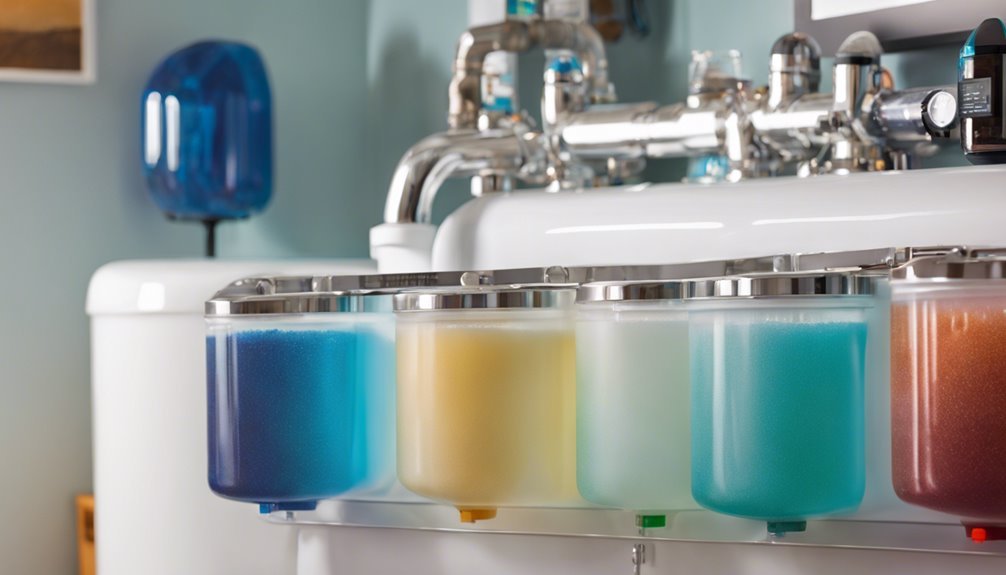What Does 27000 Grain Capacity for Water Softner Mean?
If you've ever noticed scale buildup on your faucets, you might wonder what a 27,000 grain capacity for a water softener means for your home. This capacity indicates how much hardness, primarily calcium and magnesium, the system can remove before it needs to regenerate. It's designed to accommodate the needs of an average household, but how exactly does it affect your daily water use and appliance efficiency? Understanding these nuances can help you make an informed choice for your softening needs.
Key Takeaways
- A 27,000 grain capacity indicates the maximum hardness minerals a water softener can remove before needing regeneration.
- It is suitable for average-sized households with moderate water hardness and daily usage.
- This capacity allows for less frequent regenerations, improving maintenance efficiency and reducing costs.
- Higher grain capacities minimize mineral buildup in appliances, enhancing their longevity.
- It ensures consistent availability of soft water, improving overall comfort and cleaning efficiency.
Understanding Grain Capacity
Understanding grain capacity is vital for selecting the right water softener for your needs. Grain capacity refers to the amount of hardness minerals a water softener can remove before it requires regeneration. This measurement is significant because it directly correlates with the efficiency of your softening system and the quality of water you receive.
When evaluating grain capacity, consider your household's water hardness, which is typically measured in grains per gallon (GPG). Higher water hardness means more minerals, such as calcium and magnesium, present in your water. If your water hardness is significant, you'll need a softener with a higher grain capacity to guarantee it effectively treats your water without frequent regeneration cycles.
For example, if your home has a water hardness of 20 GPG and a daily water usage of 50 gallons, you'll need a softener with a grain capacity of at least 30,000 grains to manage that demand efficiently.
Importance of Water Softening
Water softening plays a pivotal role in improving the overall quality of your household water. By reducing hard minerals like calcium and magnesium, water softeners help prevent scale buildup in pipes and appliances. This not only enhances water quality but also contributes to plumbing longevity, saving you money on repairs and replacements.
Here's a quick overview of the benefits of water softening:
| Benefit | Description | Impact on Home |
|---|---|---|
| Improved Efficiency | Softened water enhances the effectiveness of soaps and detergents, leading to cleaner clothes and dishes. | Lower utility bills |
| Extended Appliance Life | Reduces scale buildup in water heaters and dishwashers, allowing them to operate more efficiently. | Long-term savings |
| Healthier Skin | Soft water can be gentler on your skin, reducing irritation and dryness. | Enhanced comfort |
Incorporating a water softener into your home's plumbing system is essential for maintaining ideal water quality and ensuring the longevity of your plumbing infrastructure. By investing in water softening, you're not just enhancing your water experience; you're also protecting your home's value.
How Grain Capacity Is Calculated
Grain capacity is a crucial metric for evaluating the efficiency of a water softener. To perform a grain capacity calculation, you need to take into account the amount of hardness minerals, primarily calcium and magnesium, present in the water supply. The standard measurement is one grain per gallon, meaning one grain of hardness is equivalent to 0.0584 grams per liter.
First, determine the water hardness level in grains per gallon (gpg) using a water test kit. Next, calculate the total daily water usage for your household in gallons. Multiply the water hardness (gpg) by the daily water usage to find the total grains of hardness your softener must remove daily.
Finally, divide this total by the softener's regeneration frequency, typically measured in days. This will give you the grain capacity required for your water softener.
Accurate softener performance analysis guarantees that you select a unit with sufficient grain capacity to meet your household needs, preventing potential inefficiencies or overloading. Understanding this calculation helps you maintain ideal softener performance and prolongs the lifespan of your equipment.
Benefits of 27,000 Grain Capacity
A 27,000 grain capacity water softener offers several advantages that enhance your water quality and efficiency.
You'll experience extended regeneration intervals, which means less frequent maintenance and lower operating costs.
This capacity also guarantees you receive consistently soft water, making it a cost-effective solution for your household needs.
Extended Regeneration Intervals
When considering a water softener, the benefits of extended regeneration intervals become evident, especially with a 27,000 grain capacity system.
These systems allow for longer periods between regeneration cycles, which translates to enhanced operational efficiency. By stretching the time between regenerations, you can optimize salt usage and reduce water waste, making your system more environmentally friendly and cost-effective.
With extended efficiency, the 27,000 grain capacity guarantees that your water softener can handle a greater volume of hard water before it needs to regenerate.
This means you'll spend less time managing your system and more time enjoying soft water. Furthermore, longer intervals lead to less frequent downtime and maintenance, allowing you to focus on other priorities.
Moreover, the reduced frequency of regeneration cycles minimizes wear and tear on the softener, potentially prolonging its lifespan.
You'll find that it can maintain consistent performance over an extended period, yielding better results in water softness.
Improved Water Quality
With a 27,000 grain capacity water softener, you'll experience significant improvements in water quality that can enhance your daily life.
This higher capacity means your system can handle larger volumes of hard water before regeneration, allowing for consistent soft water availability. You'll notice that your water feels softer, making showers and baths more enjoyable while reducing skin irritation.
Improved water quality also leads to better performance of household appliances. Softened water minimizes mineral buildup in pipes, dishwashers, and washing machines, increasing their longevity and efficiency.
Your laundry will feel cleaner and fresher, and your dishes will sparkle without spots or streaks.
Moreover, the enhanced softener efficiency of a 27,000 grain capacity system means fewer regenerations and less salt consumption over time.
This efficiency not only improves water quality but also means you'll spend less time managing your water softening system.
Ultimately, the investment in a water softener with this capacity pays off by providing you with cleaner, softer water, resulting in a more comfortable and efficient home environment.
You'll appreciate the tangible benefits of improved water quality in every aspect of your daily routine.
Cost-Effective Solution
Finding a cost-effective solution for water treatment is vital for homeowners, and a 27,000 grain capacity water softener delivers just that. By effectively managing water hardness, this system minimizes scale buildup in plumbing and appliances, which can lead to costly repairs and replacements.
Investing in a 27,000 grain capacity unit means you're prioritizing not just immediate benefits but also long-term investment in your home's infrastructure. The cost savings from reduced maintenance and longer lifespans of appliances can be significant.
You'll notice a decrease in energy bills, as softened water allows appliances to operate more efficiently. Furthermore, using less detergent and soap for cleaning purposes translates to further savings.
This capacity is ideal for average-sized households, striking a balance between performance and efficiency. You won't be overpaying for unnecessary capacity while still ensuring that your water remains soft, which is essential for protecting your investment in your home.
Ultimately, choosing a 27,000 grain capacity water softener is a smart move that pays off. You're making an informed decision that enhances your home's value while simultaneously providing substantial long-term cost savings.
Comparing Different Grain Capacities
When comparing different grain capacities, it's crucial to understand how grain capacity affects water softening efficiency.
Higher capacities can provide greater benefits, particularly for larger households or high water usage.
Choosing the right size guarantees you meet your specific needs without over or under-sizing your system.
Understanding Grain Capacity
Understanding grain capacity is vital for selecting the right water softener for your needs, as it directly impacts how effectively the system can manage water hardness. The grain capacity indicates how much hardness the softener can remove before it needs regeneration, making it an essential factor in your decision-making process.
Here are three key points to take into account when comparing grain capacities:
- Daily Water Usage: Calculate your daily water consumption. A higher grain capacity is necessary for larger households or higher usage scenarios to guarantee that your softener can keep up with demand.
- Water Hardness Levels: Understand the hardness of your water supply. If you have extremely hard water, you might need a system with a higher grain capacity to effectively reduce the hardness levels.
- Regeneration Frequency: Reflect on how often you want your water softener to regenerate. A higher grain capacity can extend the time between regenerations, leading to less frequent maintenance.
Benefits of Higher Capacity
Opting for a water softener with a higher grain capacity offers several advantages that can enhance your overall water quality and system efficiency. With increased grain capacity, your system can tackle larger volumes of hard water before regeneration is needed. This means you'll enjoy higher efficiency and fewer interruptions in water usage.
Additionally, a higher capacity unit often results in long-term savings. By regenerating less frequently, you'll use less salt and water, ultimately lowering your utility bills. Here's a quick comparison to illustrate the benefits:
| Capacity (Grains) | Regeneration Frequency | Salt Usage | Efficiency Rating |
|---|---|---|---|
| 20,000 | Every 3 days | 200 lbs/year | Moderate |
| 30,000 | Every 4 days | 150 lbs/year | High |
| 40,000 | Every 5 days | 120 lbs/year | Very High |
| 60,000 | Every 7 days | 100 lbs/year | Superior |
As you can see, higher capacity units not only reduce the need for frequent maintenance but also optimize the overall performance of your water softening system.
Choosing the Right Size
Choosing the right size water softener involves considering your household's specific water usage and hardness levels. Understanding how to match the softener sizing to your needs is essential for ideal performance.
Here are three key capacity considerations:
- Daily Water Usage: Estimate your household's daily water consumption. A family of four typically uses around 60-80 gallons per day. This figure helps determine the necessary grain capacity.
- Water Hardness: Test your water to find its hardness level, measured in grains per gallon (gpg). The higher the hardness level, the more capacity you'll need. For example, if your water has a hardness of 10 gpg, and your daily usage is 80 gallons, you'll require a softener with at least a 800-grain capacity for effective treatment.
- Regeneration Frequency: Consider how often the softener will regenerate. A larger capacity may extend the time between regenerations, which can be more efficient for larger households.
Factors Affecting Your Choice
When selecting a water softener, several factors influence your decision, such as household size, water hardness, and daily water usage.
First, consider your household size; larger families typically require systems with higher grain capacities to accommodate increased demand.
Next, assess your water hardness level. Hard water contains varying amounts of calcium and magnesium, which directly affect how much hardness your softener needs to address.
Daily water usage is another essential factor. Calculate your average daily consumption to determine the appropriate grain efficiency for your needs. This figure helps you choose a system that regenerates efficiently without wasting resources.
Capacity considerations play a significant role in ensuring you select a softener that can handle your specific requirements. A system with a 27,000 grain capacity might suit a moderately sized household with average hardness levels, but if your needs exceed that, you may require a larger unit.
Ultimately, understanding these key factors will guide you toward a water softener that effectively balances grain efficiency and capacity, ensuring maximum performance and longevity in your home.
Maintenance and Regeneration Needs
Proper maintenance and timely regeneration are essential for keeping your water softener operating efficiently.
To guarantee peak performance, you need to pay attention to the regeneration frequency and follow some maintenance tips.
Here are three key aspects to focus on:
- Regularly Check Salt Levels: Monitor the salt levels in your brine tank. Low salt can lead to inadequate regeneration, affecting the softener's efficiency.
- Schedule Regeneration: Based on your household's water usage, set a regeneration schedule. This could be weekly or bi-weekly, depending on your water softener's capacity and your water hardness.
- Clean the System: Periodically clean the resin beads and the brine tank to prevent buildup and guarantee effective ion exchange during regeneration.
Choosing the Right Softener for You
After confirming your water softener is well-maintained and regenerating properly, the next step is to select the right model for your needs. You'll encounter various softener types, including salt-based, salt-free, and dual-tank systems. Each type has distinct advantages and may suit specific household requirements better than others.
When reviewing softener types, consider your household's water hardness, daily water usage, and the number of occupants. Capacity considerations are essential; for example, a unit with a 27,000 grain capacity may work for smaller families or homes with moderate hardness levels.
However, larger households or those with high water consumption might require a system with a higher grain capacity. Take the time to calculate your total water usage and hardness levels to determine the right capacity. This way, you'll avoid frequent regenerations and guarantee peak performance.
Furthermore, consider the long-term costs associated with each type, including salt, maintenance, and replacement parts. By carefully evaluating these factors, you can confidently choose a water softener that not only meets your current needs but also adapts to any future changes in your household.
Frequently Asked Questions
How Long Does a 27,000 Grain Softener Last Before Replacement?
A 27,000 grain softener typically lasts about 10 to 15 years. Keep an eye out for replacement indicators like decreased water quality or increased hardness levels, which can signal that it's time for a new unit.
Can a 27,000 Grain Softener Handle Hard Water Over 30 Gpg?
When facing the relentless tide of hard water above 30 gpg, a 27,000 grain softener struggles. You'll need more robust treatment options to effectively manage mineral buildup and guarantee your water quality remains pristine.
Is Installation Difficult for a 27,000 Grain Water Softener?
Installing a 27,000 grain water softener isn't overly difficult if you've got the right installation tools and follow the installation process carefully. Familiarity with plumbing can make it easier, but basic DIY skills are usually sufficient.
What Type of Salt Is Best for a 27,000 Grain Softener?
Choosing the right salt for your water softener is like selecting the finest ingredients for a gourmet dish. The best salt options, like solar or rock salt, enhance salt efficiency and guarantee peak performance in your system.
Does Grain Capacity Affect Water Pressure in My Home?
Grain capacity directly impacts your softener efficiency, which can influence water pressure. A properly sized softener maintains ideal pressure, ensuring your home receives consistent flow while effectively reducing hardness without straining your plumbing system.
Conclusion
In conclusion, a 27,000 grain capacity water softener is a reliable choice for average households dealing with moderate water hardness. It guarantees consistent soft water while minimizing maintenance. But what if your household's water needs suddenly increase? Could you be left scrambling for a solution? By understanding your specific requirements and the nuances of grain capacity, you can make an informed decision that keeps your water quality in check. Don't wait until it's too late—choose wisely for your home.







